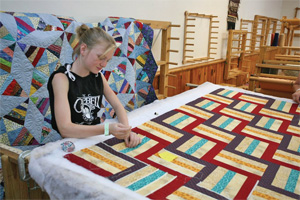Brian Sewell | December 21, 2011 | No Comments
By Julie Johnson
I was 25, slogging through yet another post-college retail job, when I realized I should run away to the hills and be a craftperson’s apprentice. It was a dream nurtured since childhood; I longed to be slavishly worked for naught but the benefit of a hands-on education and perhaps a hot meal.

From quilting to blacksmithing, students at the folk schools of Appalachia learn traditional methods from the folks dedicated to their craft. Photos by Kether Wiedeman, John C. Campbell Folk School
I shared this dream with prophetic friends who steered me to the John C. Campbell Folk School in Brasstown, N.C. There I found, through the hum of this hectic, electrified world of tweets, links and 24-hour rollback pricing, the rare breed of folks who also seek the networks of a bygone era.
The traditional craft and folk schools of Appalachia attract an eclectic bunch of teachers and learners. Some offer full degree programs while others, like John C. Campbell, host short-format classes that offer patrons a chance to take a week or weekend to become conscientious objectors of computational manufacturing.
In my time around the Folk School, I’ve seen trees become bows, coffins, faces, chairs, garden sheds and baskets, and fibers become quilts, yarns, felt, hats and clothes. I’ve seen leather shoes cobbled, knives forged, books bound and all manner of things painted, drawn, carved and enameled. I’ve seen a pictorial woodburning of Sasquatch crossing the ruined landscape of post-eruption Mt. St. Helen’s.
The people who create these crafts uphold the delicate processes of the eye and hand necessary to create a product that not only fulfills its function but also becomes an heirloom-quality treasure, and often feel a call to conserve the natural materials that go into its composition.
Even in a listless economy, enrollment holds steady, and I asked John C. Campbell director Jan Davidson why. “When times get hard, people want value for their money,” he says. “It’s worth more to learn something. It has something to do with being in control of your life, your activities, and their results.”
For the same reason, many also continue to spend their hard-earned dollars to support artisans. Cory Podielski, a former John C. Campbell student host, says she chooses to buy handcrafted goods because they are “unique and reflect the style and creativity of the artist. When you buy them, you are taking a stand against the cultural homogenization propagated by corporate attempts to mass-market to our desires,” she adds. “You are encouraging diversity, learning and creativity.”
Rob Withrow, a Brasstown, N.C., potter is encouraged by his customers often. “People come up to me all the time and tell me how they use one of my mugs every morning for their coffee, and how much they love it,” he says. “A bunch of folks, thinking good thoughts about you and what you made every day, where else can you get that? When you’re accountable to your neighbors for the product that you make, I tell you what, you put your heart into it.”
The Slow Food movement has brought worldwide focus to promoting systems of locally sourced and environmentally conscious agriculture. At a craft school, attendees can exercise the same ideals and become part of the slow stuff movement.
“The convenience of shopping kills our souls and makes us lazy,” says Podielski, “but the process and effort of craft builds up love, pride, and satisfaction. Handcrafted items are one of the core ways to build a local economy, and having a more local-based economy encourages community-building and learning. Yep, handcrafted items just might save the world.”
Save the world — or at least your sanity — at one of the fine samples of craft and folk schools of Appalachia listed below, each with its own rich history and specialized programming.
Berea College: Offers workshops and bachelor’s degree programs.
berea.edu/studentcrafts
Kentucky School of Craft: Based out of Hazard Community and Technical College, offers certificates, diplomas and AAS degrees. hazard.kctcs.edu
Pine Mountain Settlement School: Offers day and week-long programs.
pinemountainsettlementschool.com
Haywood Community College: Offers an associate degree in Professional Crafts.
haywood.edu/creative_arts/professional_crafts
John C. Campbell Folk School: Offers week and weekend classes. folkschool.org
Penland School of Craft: Offers classes from one to eight weeks. penland.org
The Appalachian Center for Craft: Based out of Tennessee Tech University, offers workshops, craft certificates and bachelor’s programs. tntech.edu/craftcenter
Arrowmont School of Arts and Crafts: Offers one- and two-week classes.
arrowmont.org
Cedar Lakes Craft Center: Offers week and weekend classes. wvde.state.wv.us/cedarlakes/craftscenter.htm
Craftworks: Offers workshops and craft events. craftworksatcoolspring.org
Virginia Commonwealth University: Offers bachelor’s and master’s degrees.
vcu.edu/arts/craft/dept
Like this content? Subscribe to The Voice email digests